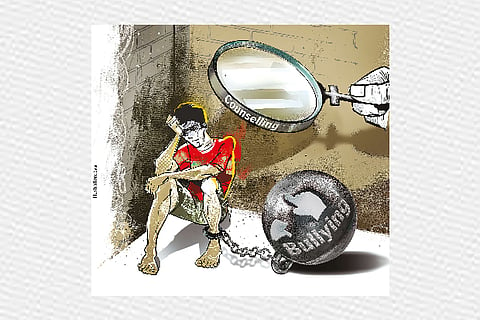

Bullying is more than just about the victim. As difficult as it is for the person being subjugated to it, the bully also goes through unresolved repressed emotions which begin at home. Ahead of Anti-Bullying Day that falls on Wednesday, DT Next spoke to city-based psychologist Dr Mini Rao to understand the impact that bullying has not just on the victim, but on the bully as well.
Psychologist Rao says, this chain can only be broken if parents understand the importance of counselling and ensure to create a healthy environment for the child.
Bullying in schools, as unfortunate as it is, is common. “Children are scared to call the bullies out in fear of being called a ‘snitch’ or even tormented further. It is very easy to spot such children by their behaviour pattern. They become socially isolated, closed-up, lethargic, an introvert, and would do anything to miss school,” says Dr Rao.
Other than having a drastic effect while in the moment, the child carries the trauma to adulthood making them constantly anxious, while also losing their self-esteem, self-worth, and confidence. These individuals also grow up to become people-pleasers while overly extending themselves to fit into the norms of other people.
The trauma creates such an impact that it also hampers their relationships and their lack of understanding of boundaries. Often, it so happens, that these adults fail to recognise toxic traits in their partners and put up with everything for the sake of feeling accepted.
In the case of the bullies, it is important to empathise with them and try to understand what pushes them to react the way they do. “The children who bully are often victims of bullying themselves. These children either see their parents beating up the other or ill-treating them, and are forced to be silent spectators. In some cases, the parents pressurise the child so much that they have no outlet to express what they feel or a safe space to sort the repressed emotions. This leads to them lashing out violently and picking on more vulnerable people to feel in control,” she says.
Dr Rao says that it is important for schools to promote and educate children on the importance of counselling in school and that every institution must compulsorily have an on-campus psychologist. “It is absolutely crucial for parents to meet with a psychologist if they feel there is something disrupting the atmosphere at home, so as to not traumatise the child. This cycle of bullying can only be broken if parents are counselled,” she says.
Visit news.dtnext.in to explore our interactive epaper!
Download the DT Next app for more exciting features!
Click here for iOS
Click here for Android